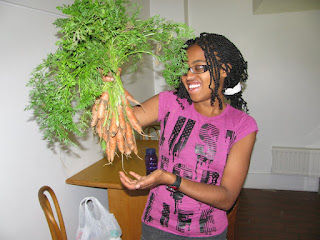-Using the cryovack and blastfreezer in the Paresky kitchen to vacuum seal and freeze kale and chard
-Blanching, peeling, quartering, and freezing tomatoes for future use in sauce/salsa
 | |
| The tomatoes |
 | |
| The blanching and peeling in process |
 | |
| Final product! Now we just need permanent freezer space... |
-Pickling the biblical cucumbers (going to happen this week)
We also harvested all of the carrots from Kellogg which maybe should have happened a bit earlier, but they're still quite tasty and impressive looking!
 |
| Some of them were really thick! |
















